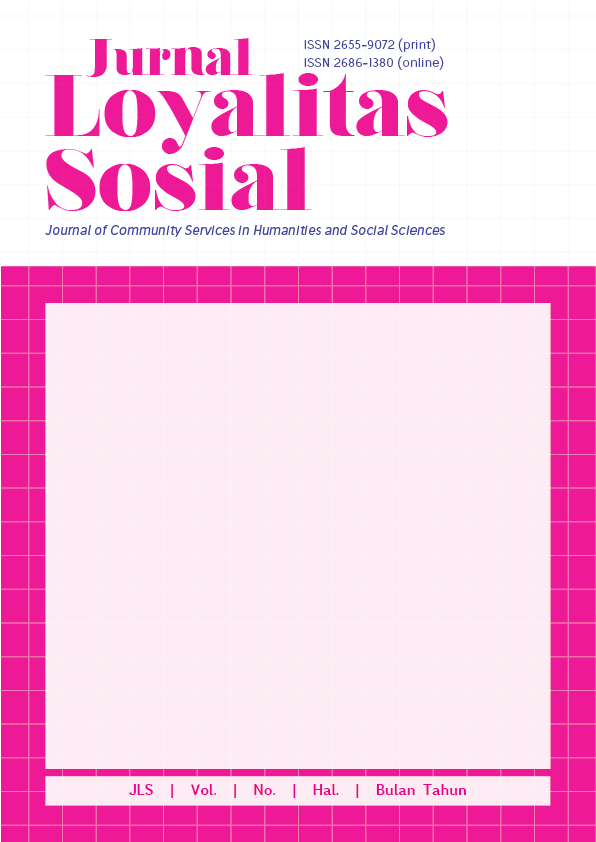Empowering Future Leaders: The Role of Religious Institutions in Addressing Social Issues Through Training and Community Engagement
DOI:
https://doi.org/10.32493/JLS.v6i2.p71-84Keywords:
religious institutions, social justice, community engagement, leadership developmentAbstract
Religious institutions are pivotal in addressing social issues, acting as agents of spiritual guidance and societal transformation. This study examines a community service program at Victory Theological College, designed to prepare future religious leaders through an integrated approach to theological education and practical social engagement. The program encompassed three phases: interactive training on social justice and contemporary issues, hands-on field practice addressing real-world challenges, and reflective evaluations to assess impact and learning. Participants demonstrated significant improvement in understanding the dual role of religious institutions in providing social aid and advocating for justice. Field activities included initiatives to combat poverty, promote racial reconciliation, foster gender equality, advocate for environmental stewardship, and support human rights. Reflective discussions highlighted the program’s success in connecting theological principles with practical solutions, preparing leaders to navigate complex social realities. The study underscores the transformative potential of combining faith-based education with community engagement, offering a replicable model for fostering justice, compassion, and sustainable development through religious institutions.
References
Abdurrohman, N., Alkautsar, L. A., Assyifaa, R., & Almira, R. A. (2024). Enhancing Environmental Awareness and Behaviors among Students at Al-Mansoura Junior High School : Community Service Activities. Jurnal Community of Urban Development, 2(1).
Ayres, J. R. (2013). Lives worth living: Religious education and social movements. Religious Education, 108(4), 367–377. https://doi.org/10.1080/00344087.2013.805030
Beyers, J. (2014). The effect of religion on poverty. HTS Teologiese Studies / Theological Studies, 70(1), 1–8. https://doi.org/10.4102/hts.v70i1.2614
Bossuroy, T., Goldstein, M., Karimou, B., Karlan, D., Kazianga, H., Parienté, W., Premand, P., Thomas, C. C., Udry, C., Vaillant, J., & Wright, K. A. (2022). Tackling psychosocial and capital constraints to alleviate poverty. Nature, 605(7909), 291–297. https://doi.org/10.1038/s41586-022-04647-8
Derksen, M., & Teixeira, C. (2023). Refugees and religious institutions in a mid-size Canadian city. Population, Space and Place, 29(5). https://doi.org/10.1002/psp.2653
Fata, F. I., Kamala, G., Sabrina, A. M., Putri, P. K., Lamu, R. M., & Purwanto, E. (2024). Integrating Environmental Education and Creative Arts in Early Childhood : A Community Development Initiative at Bait Adzkia Islamic Kindergarten. Jurnal Pengabdian Dan Kewirausahaan, 8(2), 148–156.
Gutierrez, L., Alvarez, A. R., Nemon, H., & Lewis, E. A. (1996). Multicultural Community Organizing: A Strategy for Change. Social Work, 41(5), 501–508. http://www.jstor.org/stable/23718124
Hankela, E. (2014). Faith community as a centre of liberationist praxis in the city. HTS Teologiese Studies / Theological Studies, 70(3), 1–9. https://doi.org/10.4102/hts.v70i3.2768
He, Y. (2023). Does Religious Community Participation Matter for Shaking off Poverty? Religions, 14(3). https://doi.org/10.3390/rel14030304
Kato, T. (2024). WE economy: Potential of mutual aid distribution based on moral responsibility and risk vulnerability. PLoS ONE, 19(5 May). https://doi.org/10.1371/journal.pone.0301928
Klaasen, J. S. (2019). Theology and development: Taking personal responsibility for community development. HTS Teologiese Studies / Theological Studies, 75(2), 19–20. https://doi.org/10.4102/hts.v75i2.5500
Magnus, A. M., & Sherrick, A. (2023). Saviors and Services: The Interface of Neoliberal Deprivation, Hegemonic Christianity, Social Exclusion, and Rural Church Resource Provision. Rural Sociology, 88(1), 108–134. https://doi.org/https://doi.org/10.1111/ruso.12470
Mashau, T. D., & Mangoedi, L. (2015). Faith communities, social exclusion, homelessness and disability: Transforming the margins in the City of Tshwane. HTS Teologiese Studies / Theological Studies, 71(3), 1–9. https://doi.org/10.4102/hts.v71i3.3088
Naidoo, M. (2022). Nurturing Intercultural Theological Education towards Social Justice Ideals in South Africa. Religions, 13(9). https://doi.org/10.3390/rel13090830
Panter-Brick, C. (2021). Solidarity, Social Justice, and Faith: Humanitarian Action on the U.S.-Mexico Border. Journal of Refugee Studies, 34(4), 3688–3709. https://doi.org/10.1093/jrs/feab001
Peracullo, J. C., & Quindoza, R. B. M. (2022). The Environmental Activism of a Filipino Catholic Faith Community: Re-Imagining Ecological Care for the Flourishing of All. Religions, 13(1). https://doi.org/10.3390/REL13010056
Privor-Dumm, L., & King, T. (2020). Community-based Strategies to Engage Pastors Can Help Address Vaccine Hesitancy and Health Disparities in Black Communities. Journal of Health Communication, 25(10), 827–830. https://doi.org/10.1080/10810730.2021.1873463
Purwanto, E. (2024). Gereja & Isu-Isu Sosial. Yayasan Pendidikan Philadelphia.
Putri Aiko, K., Nurmalasari, S., Reza, M., Pasya Athalla Nadhifa, E., Nashita Lumi, A., Purwanto, E., & Author, C. (2024). Empowering environmental awareness in Kindergarten: A community development initiative on plastic waste management. Penamas: Journal of Community Service, 4(2), 257–268. https://doi.org/10.53088/penamas.v4i2.1103
Rakotoarison, Z. R., Dietrich, S., & Hiilamo, H. (2021). Faith as an asset in a community development project: The case of madagascar. HTS Teologiese Studies / Theological Studies, 77(4), 1–10. https://doi.org/10.4102/hts.v77i4.6470
Rivera, J. D., & Nickels, A. E. (2014). Social Capital, Community Resilience, and Faith-Based Organizations in Disaster Recovery: A Case Study of Mary Queen of Vietnam Catholic Church. Risk, Hazards and Crisis in Public Policy, 5(2), 178–211. https://doi.org/10.1002/rhc3.12050
Schweiger, G. (2019). Religion and poverty. Palgrave Communications, 5(1), 3–5. https://doi.org/10.1057/s41599-019-0272-3
Tamlin, H., Cresswell, J., & Hoppe, A. (2021). Experiencing visions of Canadian church workers: Exploring the mentality fueling systems involved in poverty reduction. Journal of Community Psychology, 49(6), 1748–1766. https://doi.org/https://doi.org/10.1002/jcop.22555
Van Der, M., Westhuizen, Smith, R., & Beukes, J. W. (2019). Exploring the social function of congregations: A community development approach to develop ‘hub-and-spill’ early childhood development centres. HTS Teologiese Studies / Theological Studies, 75(2), 1–8. https://doi.org/10.4102/hts.v75i2.4850
Vorster, J. K. M. (2015). Kingdom, church and civil society: A theological paradigm for civil action. HTS Teologiese Studies / Theological Studies, 71(3), 1–7. https://doi.org/10.4102/hts.v71i3.2816
Downloads
Published
How to Cite
Issue
Section
License
Copyright (c) 2024 Edi Purwanto

This work is licensed under a Creative Commons Attribution-NonCommercial-ShareAlike 4.0 International License.
This journal is licensed under a Creative Commons Attribution-ShareAlike 4.0 International License.
















